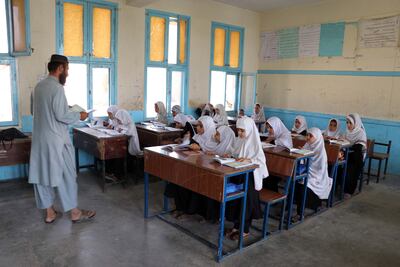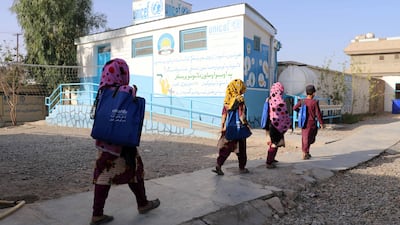If there was one story to sum up the tragedy of the Taliban's takeover of Afghanistan and the lost potential of a country that was slowly building itself up over two decades, it would be the state of Afghan girls' education.
Sunday marked the anniversary of the Taliban's decision to ban girls from attending school past grade six. Afghanistan is the only country where such a ban is in place.
A girl's right to receive an education is a common target for the most extreme ideologues; an educated female population is a bulwark against tyranny. The problem in Afghanistan is that an extremist belief system now controls an entire state, giving its proponents the means and impunity to create damage on a national scale. Although some districts in Afghanistan have kept girls' schools open, they have done so in open defiance of the official diktats of the country's new leadership. They are a small minority, and the exception that proves a terrible rule.
And while girls' schools have become the cause celebre of large sections of the international community who find the Taliban's policies unacceptable, little progress has been made. The anniversary, therefore, is an important moment to keep up the pressure. Markus Potzel, the current head of the UN Assistance Mission in Afghanistan, described Sunday as a "tragic, shameful, and entirely avoidable anniversary". He went on to say: "The ongoing exclusion of girls from high school has no credible justification and has no parallel anywhere in the world. It is profoundly damaging to a generation of girls and to the future of Afghanistan itself."

UN Secretary General Antonio Guterres wrote on Twitter for the anniversary that the past year was one of "lost knowledge and opportunity that they will never get back".
Learning has been on the UN's mind more generally in recent days. Hours before it began its Transforming Education Summit on Friday, Unicef released findings that show that only a third of 10-year-olds globally are thought to be capable of reading and understanding a simple written story.
In most countries, the inability to serve children this basic right will be down to poverty and uncontrollable hardship. In Afghanistan, however, it is in large part down to a deliberate, and entirely unnecessary, policy. That is why the international community must remember in all its dealings with the Taliban going forward that helping the country's girls must be the priority.
After all, another key difference between the Taliban and their extremist counterparts in other places is that, as it tries to create something resembling a viable, recognised administration, it needs to engage with the world. In this regard, the international community has a great deal of power to help protect Afghan girls. If the Taliban is to secure any of its major strategic objectives it must show that it is willing to govern all Afghanistan's people fairly.
It is important to remember that individual action can help, too, particularly by men in Afghanistan. In an essay for The National in May, teacher and education activist Ziauddin Yousafzai, whose daughter Malala Yousafzai was shot for her stand against the Pakistani Taliban's policies on girls in 2009, wrote about the need of Afghan men, particularly fathers, to fight for girls' education. "It is obviously scary to do so," he wrote: "But it is more scary to do nothing, and deprives their nation of a prosperous future."
The scary future Mr Yousafzai writes of is one where the already terrible situation of Afghanistan's girls gets worse, bringing not just women, but all of Afghanistan down. The leverage is there for the international community to do something about it, and the power in Afghanistan's men, too. It is to be hoped that by the next anniversary more of it has been used.


